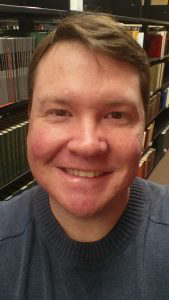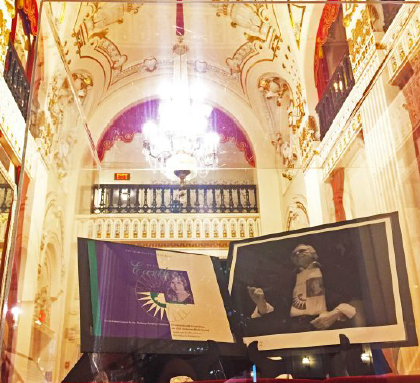Name: Ryan Woodward
What do you do here at The Jennie King Mellon Library?
I’m a reference associate on nights and weekends.
What made you choose your current profession?
I have always been a fan of the library. As a graduate assistant in my master’s program, my office was in the library where I helped students find resources for their papers and projects and found the library to be a natural fit for helping students reach their research goals.
When you were a child, what did you want to be when you grew up?
Either a carpenter like my dad or a veterinarian because I loved animals. Both required math and science skills far above my abilities in those areas.
What’s your favorite part of your job?
Occasionally, I am able to help a student in an area of particular interest to me (music, history, the humanities) and I’m able to have conversations about their research, make recommendations on sources, or just discuss their interests beyond just helping them locate a book or article.
If you could do one thing to change/improve the JKM Library- with no worries about time or expense, what would you do?
Maybe have in-house IT help to assist students some of their technology issues. I can help a bit, but sometimes if they’re coming to me with tech questions, it is likely on an issue that is best addressed with the Help Desk.
What do you like to do on your days off?
I spend a lot of time with cats and dogs, and when possible, supporting live music and the arts. On weekends, I am a fan of seeking out good, no-frills diners for breakfast, of which Pittsburgh has several that are pretty great.
What’s the last thing you checked out?
From JKM, I checked out the DVD From Pittsburgh to Poland (2005), produced locally by WQED. This was a nicely done documentary detailing a group of Pittsburgh area teachers traveling to Poland with three Holocaust survivors and touring historic sites from World War II. (You can currently find this item on the Holocaust Remembrance display on the first floor of the library.) Having studied this subject and made a similar trip a few years ago, I can attest to the impact visiting historical sites can have. There is an enormous layer of perspective gained when you are able to view artifacts up close, walk in places where events occurred, and fully take in the dimensions of buildings, spaces, and the contemporary culture. This appreciation of perspective is evident in the educators who are interviewed throughout the film. The diversity of the of the three survivors’ experiences underscores how the Holocaust should be viewed and studied not as a single event, but rather a period when millions of lives were affected differently, even if major elements of each constitute a shared experience.
Among the survivors, we meet a ghetto escapee who later joins the partisans to fight the Nazis and their collaborators, a child hidden and cared for by a Gentile family, and a laborer rescued by being included on Oskar Schindler’s list. Highlighting the experiences of survivors who would later settle in Pittsburgh makes a deeper connection for local viewers of the film. Each person could very well be a neighbor or co-worker, reinforcing the idea that the Holocaust did not happen in some alien dimension nor did it occur in ancient history. It can happen anywhere and to anyone.
From Pittsburgh to Poland runs 60 minutes and is available at the library’s Media Shelves when not included in displays. It is an asset to the collection due to its thoughtful portrayal of historical events as seen by local citizens.
What book do you think everyone should read? Why?
To Kill a Mockingbird by Harper Lee (1960) might seem like a generic answer of a go-to classic, but the novel remains legendary for good reason. Regardless of time, the themes found in small American towns, particularly in the south, are relatable to a lot of people whose own upbringings may resemble those in the story. Themes of racism, poverty, gender roles, and justice are unfortunately still hot topics today, but everyone has the capacity to read about attitudes and events of the past and apply them toward making a better future.
What are 5 or so of your favorite books or movies that we have here in the JKM Library that are available for checkout?
Quiet: The Power of Introverts in a World That Can’t Stop Talking by Susan Cain (2012): Invaluable for those with introverted personalities and helpful for anyone who will manage diverse groups of employees, work with students, or cultivate meaningful interpersonal relations.
Orchestral works [sound recording] by Richard Strauss (2000): Specifically, the piece Tod und Verklärung (Death and Transfiguration), a tone poem that lasts over 20 minutes. I played this with my college orchestra and it was one of the most challenging yet satisfying music experiences ever. Amazing piece!
Fun home: A Family Tragicomic by Alison Bechdel (2006): I read this just this year for a book group at Carnegie Library of Pittsburgh. It turned me on to graphic novels, which I had not read many of before and offers some great universal coming of age themes as well as experiences unique to LGBTQ+ people.
Nine and Counting: The Women of the Senate by Barbara Mikulski [and others] (2000): While the number of women in the U.S. Senate has grown, only three of those profiled in this book remain in Congress. It’s interesting to see the diverse paths each took to become some of the most powerful people in the world and how some issues such as family and medical leave or funding for women’s health research held little priority until women were elected to high office.
Batman [DVD] (1966): The 1960s Batman movie and television series are ridiculously fun. I met Lee Meriwether (Catwoman) several years ago. Super nice and a class act.
What’s one thing you think everyone should do while they live in the city?
Celebrate Pittsburgh’s rich zombie-film heritage, OR, at least appreciate the region’s popularity with filmmakers. I am a horror fan and have been excited during my year and a half in Pittsburgh to have tracked down filming locations for some of my favorite movies. There are a number of festivals, screenings, and conventions to attend throughout the year and the city is lucky to have several small, independent theaters that routinely show independent films, art house cinema, and documentaries.
Tell us some surprising things about yourself:
1. I’ve lived in 4 states, have traveled to 8 different countries.
2. I work with a non-profit organization that creates opportunities and advocates for increased participation of women and girls in all areas of baseball.
3. I helped create a music camp for student string players as an undergraduate for my university, which will celebrate its 14th year next year.




April is National Poetry Month, and we at the JKM Library have a soft spot in our literary hearts for poetry. This month, student workers Alie Davis and Carina Stopenski worked together to design and curate our Main Book Display. Items selected ranged from classics like Sylvia Plath to Chatham students’ chapbooks and everything in between. While all the poetry collections on display are worth checking out and exploring, Alie Davis has selected three that stand out to her. Read her bite-sized reviews below for poetry collections you can check out today!
Andrea Gibson’s first book, Pole Dancing to Gospel Hymns, inspires action in all of its readers. This collection is brimming with brutal tenderness. Gibson covers topics that are relevant to the current political climate. This collection is full of poems about gender, love, violence, and an overwhelming optimism for surviving no matter what. Lori Jakiela, a local Pittsburgh poet, released her chapbook, Big Fish in 2016. This collection sings with humor, playfulness, and light, but does not shy away from the hard things. Jakiela writes about landscape, motherhood, and giant fish sandwiches. Big Fish is a rich collection to dive into and swim through. Lighthead by Terrance Hayes is his fourth collection to be published. Always blurring the line between story and song, and reality and dream, Hayes engages with how we ground ourselves in the everyday and how we construct experience. Musical and dream-like, Lighthead offers meditations on desires and history. Masterful precision of language and sound moves this collection to a Must-Read for all.
Commenting on blog posts requires an account.
Login is required to interact with this comment. Please and try again.
If you do not have an account, Register Now.